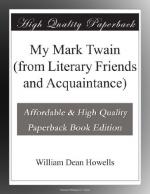I shall, not try to give chronological order to my recollections of him, but since I am just now with him in Hartford I will speak of him in association with the place. Once when I came on from Cambridge he followed me to my room to see that the water was not frozen in my bath, or something of the kind, for it was very cold weather, and then hospitably lingered. Not to lose time in banalities I began at once from the thread of thought in my mind. “I wonder why we hate the past so,” and he responded from the depths of his own consciousness, “It’s so damned humiliating,” which is what any man would say of his past if he were honest; but honest men are few when it comes to themselves. Clemens was one of the few, and the first of them among all the people I have known. I have known, I suppose, men as truthful, but not so promptly, so absolutely, so positively, so almost aggressively truthful. He could lie, of course, and did to save others from grief or harm; he was, not stupidly truthful; but his first impulse was to say out the thing and everything that was in him. To those who can understand it will not be contradictory of his sense of humiliation from the past, that he was not ashamed for anything he ever did to the point of wishing to hide it. He could be, and he was, bitterly sorry for his errors, which he had enough of in his life, but he was not ashamed in that mean way. What he had done he owned to, good, bad, or indifferent, and if it was bad he was rather amused than troubled as to the effect in your mind. He would not obtrude the fact upon you, but if it were in the way of personal history he would not dream of withholding it, far less of hiding it.
He was the readiest of men to allow an error if he were found in it. In one of our walks about Hartford, when he was in the first fine flush of his agnosticism, he declared that Christianity had done nothing to improve morals and conditions, and that the world under the highest pagan civilization was as well off as it was under the highest Christian influences. I happened to be fresh from the reading of Charles Loring Brace’s ‘Gesta Christi’; or, ‘History of Humane Progress’, and I could offer him abundant proofs that he was wrong. He did not like that evidently, but he instantly gave way, saying he had not known those things. Later he was more tolerant in his denials of Christianity, but just then he was feeling his freedom from it, and rejoicing in having broken what he felt to have been the shackles of belief worn so long. He greatly admired Robert Ingersoll, whom he called an angelic orator, and regarded as an evangel of a new gospel—the gospel of free thought. He took the warmest interest in the newspaper controversy raging at the time as to the existence of a hell; when the noes carried the day, I suppose that no enemy of perdition was more pleased. He still loved his old friend and pastor, Mr. Twichell, but he no longer went to hear him preach his sage and beautiful




